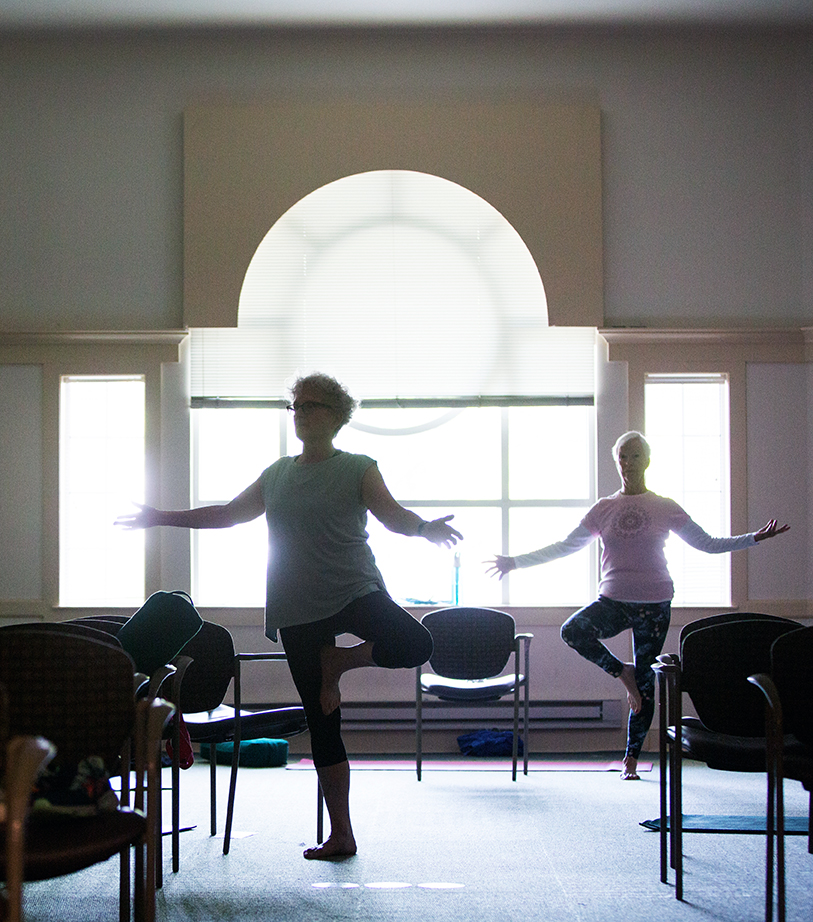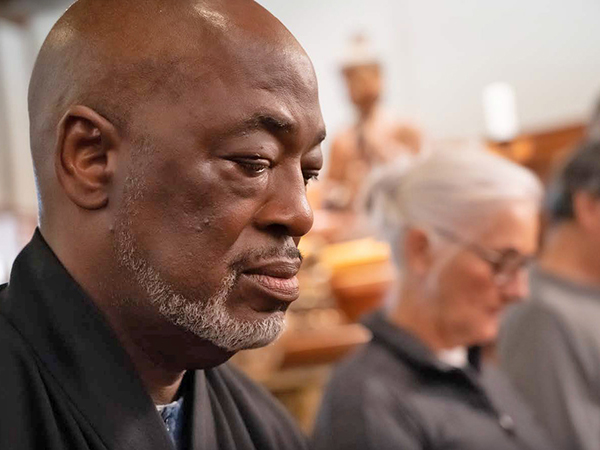Mindfulness in Retirement Communities
Over the past decade, residents and staff in Kendal senior living communities have adopted a variety of mindfulness-based practices—including meditation, yoga reiki and tai chi—to reduce stress and enhance well-being.
Mindfulness practices, like meditation, yoga, reiki and tai chi, are finding their way into daily routines at retirement communities, weaving threads of calm and purpose into the tapestry of active aging. This isn’t a fad, but a testament to the evolving needs of older adults who seek not just physical activity, but a holistic approach to well-being.
Inspired by the Quaker tradition of seeking truth and inner peace through inward silence, these mindfulness practices transcend age and ability. They offer a space for residents to find quiet amidst the everyday busyness, cultivating resilience against stress and striving for the well-being of mind, body, and spirit. Whether it’s the mindful pause before an afternoon activity, the gentle stretches imbued with a sense of connection, or the savoring of a meal with gratitude, these practices offer opportunities for seniors to connect with themselves and their surroundings in a meaningful way, echoing the Quaker emphasis on simplicity, contemplation, and shared humanity.
GUIDED BY VALUES
Learn more about Quakerism and the foundation for Kendal’s values by viewing an educational video series.

Cultivating Calm and Connection
How Mindfulness Benefits Kendal Residents
Growing evidence suggests that mindfulness practices are more than just trendy relaxation techniques; they can have lasting effects on both the mind and body.
Scientific Backing:
- Neuroplasticity in Action: Dr. Daniel Goleman, co-author of “Altered Traits: Science Reveals How Meditation Changes Your Mind, Brain, and Body,” highlights the potent impact of meditation, stating, “The best data shows powerful impacts from meditation right from the beginning. The more hours of practice you accumulate, the stronger the benefits.”
- Measurable Improvements: Studies have shown that consistent mindfulness practice can lead to a range of benefits, including:
- Improved sleep: Participants in group mindfulness programs often report falling asleep faster and sleeping more soundly.
- Lower blood pressure: Research indicates that mindfulness can effectively reduce stress-related high blood pressure.
- Improved digestion: Studies suggest that mindfulness can lessen stress-induced digestive issues.
- Greater self-control: Mindfulness practices can enhance focus and emotional regulation, leading to improved self-control.
- Pain management: Mindfulness techniques can help individuals manage chronic pain more effectively.
Embracing Mindfulness
Kendal communities across the country are actively incorporating mindfulness practices into their culture.
- Kendal at Ithaca: Laura Peters, Human Resources Development and Learning Manager, observes how mindfulness strengthens their community: “It’s gratifying to see how mindfulness practice strengthens Kendal culture as residents and staff grow more resilient in the face of stress. There’s less conflict, more cooperation and kindness toward self and others.”
- Barclay Friends: Their Personal Care and Memory Care program specifically focuses on mindfulness, with staff trained in techniques like structured silence and guided meditation.
- Kendal at Oberlin offers a unique approach to tai chi, providing classes both on land and in the water. This “meditation in motion” involves slow, precise movements synchronized with deep breathing, offering numerous benefits for older adults.
- Enhanced physical well-being: Tai chi demonstrably improves flexibility and balance, fostering confidence and reducing the risk of falls. Studies have shown a remarkable 45% reduction in falls among older adults practicing tai chi regularly.
- Stress and anxiety reduction: Beyond physical benefits, tai chi promotes mental well-being by alleviating stress and anxiety. Its meditative qualities provide a sense of calm and inner peace, contributing to overall emotional well-being.

A Zen-Inspired Community
And now, Kendal has partnered with the San Francisco Zen Center to develop a community that leads with mindfulness and meditation. This Zen-inspired community called Enso Village is located in Healdsburg, California. The ensuing discussion focused on the Zen concept of “contemplative care” and similarities between Quaker and Zen values.
Kendal Affiliates Offering Mindfulness-Based Practices
These examples illustrate how mindfulness is not just a personal benefit, but can contribute to a more positive and supportive environment for everyone within a community. By integrating mindfulness practices into their daily lives, residents and staff at Kendal communities are cultivating a culture of calm, connection, and overall well-being.
| Meditation | Yoga | Tai Chi | Reiki | |
| Admiral at the Lake | X | X | ||
| Barclay Friends | X | X | ||
| Collington | X | X | ||
| Kendal at Hanover | X | X | X | X |
| Kendal at Ithaca | X | X | X | |
| Kendal at Oberlin | X | X | X | X |
| Kendal on Hudson | X | X | ||
| Lathrop Community | X | X | X | X |
